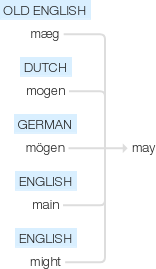May
Old English mæg, of Germanic origin, from a base meaning ‘have power’; related to Dutch mogen and German mögen, also to main1 and might2.
wiktionary
From Middle English mowen, mayen, moȝen, maȝen, from Old English magan, from Proto-West Germanic *magan, from Proto-Germanic *maganą, from Proto-Indo-European *megʰ-.
Cognate with Dutch mag(“may”, first and third-person singular of mogen(“to be able to, be allowed to, may”)), Low German mögen, German mag(“like”, first and third-person singular of mögen(“to like, want, require”)), Swedish må, Icelandic mega, megum. See also might.
French mai, so called because it blossoms in the month of May.
Shortening of maid, from maiden.
etymonline
may (v.1)
Old English mæg "am able" (infinitive magan, past tense meahte, mihte), from Proto-Germanic root *mag-, infinitive *maganan (Old Frisian mei/muga/machte "have power, may;" Old Saxon mag/mugan/mahte; Middle Dutch mach/moghen/mohte; Dutch mag/mogen/mocht; Old High German mag/magan/mahta; German mag/mögen/mochte; Old Norse ma/mega/matte; Gothic mag/magan/mahte "to be able"), from PIE root *magh- "to be able, have power." A present-preterit verb (with can, shall, etc.). Also used in Old English as a "auxiliary of prediction."
May
fifth month of the modern calendar, early 12c., Mai, from Old French mai and directly from Latin Majus, Maius mensis "month of May," possibly from Maja, Maia, a Roman earth goddess (wife of Vulcan) whose name is of unknown origin; possibly from PIE *mag-ya "she who is great," fem. suffixed form of root *meg- "great" (cognate with Latin magnus).
"[R]eckoned on the continent of Europe and in America as the last month of spring, but in Great Britain as the first of summer" [Century Dictionary, 1897]. Replaced Old English þrimilce, month in which cows can be milked three times a day. May marriages have been considered unlucky at least since Ovid's day. May-apple, perennial herb native to North America, so called for its time of blooming and its yellowish fruit, is attested from 1733, American English.
may (v.2)
"to celebrate May Day, to take part in May Day festivities," late 15c., from May. Maying as "the observance of May Day with all its sports and games" is attested from late 14c. (maiing).
And as a vapour, or a drop of raine
Once lost, can ne'r be found againe:
So when or you or I are made
A fable, song, or fleeting shade;
All love, all liking, all delight
Lies drown'd with us in endlesse night.
Then while time serves, and we are but decaying;
Come, my Corinna, come, let's goe a Maying.
[Robert Herrick, "Corinna's Going a-Maying," 1648]
